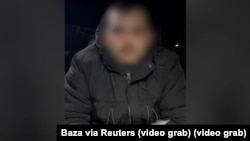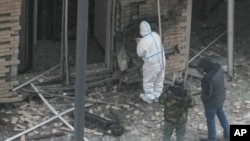"Inspections will intensify." Central Asian migrants express fears following the murder of a Russian general.
The Russian authorities reported on December 18 about the arrest of a 29-year-old citizen of Uzbekistan in connection with the murder of a high-ranking general in Moscow.
This news is extremely troubling for the large community of Central Asian migrants in Russia.
Moscow claims that the murder of Lieutenant General Igor Kirillov, the highest-ranking Russian military officer killed since Russia's full-scale invasion of Ukraine in 2022, was orchestrated by Kyiv. A source in Ukraine's security service informed Azattyk that the assassination was organized by the Ukrainian side.
However, the arrest of the Uzbek citizen, who Moscow alleges carried out Ukraine's order to eliminate Kirillov, has instilled fear and panic among Central Asian migrants in Russia.

In recent years, xenophobic attacks on migrants from Central Asia in Russia have increased. Thousands have been deported or denied entry into Russia. Many have reported threats and abuse.
Now, Central Asian migrants expect their situation in Russia to worsen.
“Police vans are everywhere,” says Zulfiya, a citizen of Uzbekistan living in Moscow. “Today, I walked near the market and saw several vans there. They were detaining everyone—Uzbeks, Kyrgyz, and Tajiks.”
“Yesterday, they deported my acquaintance along with her daughter,” adds Zulfiya, who prefers not to disclose her last name for fear of retaliation.
ANTI-MIGRANT RHETORIC WILL BE INTENSIFIED
For decades, Russia has been a primary destination for millions of labor migrants from Central Asia. They have had to endure persecution and discrimination to support their families.
Following a terrorist attack at a concert hall in the Moscow region in March, which resulted in the deaths of around 140 people, Russian authorities intensified their crackdown on migrants.
Several citizens of Tajikistan were detained on suspicion of involvement in the attack. They appeared in court, where the selection of a preventive measure was considered, showing clear signs of beatings and torture.
The speed of the arrest of the Uzbek man suspected of killing Kirillov—the chief of radiation, chemical, and biological protection forces—has led some analysts to suggest that the suspect is a scapegoat.

Alisher Ilkhamov, an Uzbek analyst and director of the UK-based research center Central Asia Due Diligence, states that the suspect was “most likely” tortured.
Uzbeks will be portrayed as “villains to some extent in this extraordinary event,” believes Ilkhamov.
The Federal Security Service of Russia (FSB) stated that the suspect was recruited by Ukrainian intelligence and underwent training. According to the investigation, Kirillov and his aide were killed by an explosive device that was planted in an electric scooter at the entrance of the building where the lieutenant general and his companion exited.
The FSB released a video of the suspect's “confession.” In the footage, a man, apparently with cuts on his face, claims he was promised “$100,000 and a European passport.”
“Anti-migrant rhetoric has recently become very popular among Russian politicians,” notes Ilkhamov. “Now it will be intensified. We can expect to hear more of it from Russian television experts and lawmakers.”
FORECAST: INCREASED STREET CHECKS
Among the Russian political figures who have made anti-migrant statements is Alexander Bastrykin, a chief ally of Russian President Vladimir Putin and head of the Investigative Committee.
Last year, Bastrykin stated that migrants who received Russian citizenship should be stripped of it if they refuse to fight in Ukraine.
He also mentioned a surge in crimes committed by migrants.
“People say: ‘As long as Russians are on the front, migrants are attacking our rear,’” said Bastrykin.
A woman from Kyrgyzstan living in Moscow believes that the conditions for Central Asian migrants are already difficult.
“I think the situation for Central Asian migrants will only worsen after this incident,” said the woman, who spoke on the condition of anonymity for safety reasons. “Street checks are likely to increase.”